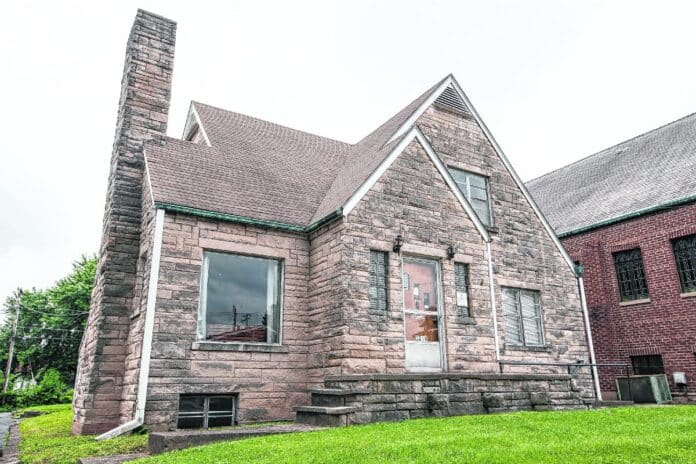
Two ministries are partnering to establish a Christ-centered addiction recovery facility in Bartholomew County.
Chain Breaker Ministries, a nonprofit organization formed by concerned Columbus-area Christians, is teaming up with the Indianapolis-based Wheeler Mission in the effort.
If area churches and others are willing to assist, the two ministries hope to transform a 2,282-square-foot former church parsonage at 1218 California St. into an abstinence-based intake center for six to eight men with alcohol or drug addictions, according to Chain Breaker project leader Rick Colglazier. The facility will be named Chain Breaker House.
The former parsonage, with three bedrooms and a finished basement, is large enough for the intake center, organizers said.
[sc:text-divider text-divider-title=”Story continues below gallery” ]Click here to purchase photos from this gallery
Representatives of the organization canvased 61 homes within a four-block area surrounding the parsonage and nearby former church, and hosted three neighborhood meetings about the project, Colglazier said.
The intake center will house no more than six recovering addicts at one time and is not designed as a half-way house, organizers explained. The individuals in recovery will be supervised by a program manager, as well as two senior leadership trainers, said Cal Nelson, Wheeler vice president of men’s programming.
Each client would stay for not more than six weeks in the Columbus facility before being moved to a remote location north of Bloomington for several months of long-term addiction treatment, Nelson said.
Wheeler has a very strict criteria of evaluating potential clients that includes not admitting any person who has ever been convicted of child molesting, Nelson said.
The Indianapolis ministry is also quite skilled at screening out applicants who are unprepared for the intensive recovery program, according to Chain Breaker member and Columbus attorney Peter King.
“So far, we’ve had a positive response (from the neighbors),” King said.
While the intake center is small enough not to require a variance from the Columbus Board of Zoning Appeals, King emphasizes it’s still not a done deal.
“We still have some building code issues, and have an architect working with us on that,” King said.
A heartfelt mission
Colglazier has a personal reason for his involvement in creating the intake center. His son, Tyler D. Colglazier, found success with Wheeler’s program while being treated for a heroin addiction from December 2015 to August 2016, he said.
“His time with Wheeler was likely the best stage of his later life,” Rick Colglazier said. “When he came out (of treatment), he seemed whole and at peace.”
But a year-and-a-half later, Tyler Colglazier relapsed and died at age 31 of an overdose, his father said.
In their grief, the Colglazier family wanted to take action that would help others recover from addiction and also to help their families, King said.
Last October, representatives from both ministries initially met to begin putting concepts together for the Columbus program. As a result of that meeting, Pastor Dan Taube of the Columbus Missionary Alliance Church eventually offered to provide the parsonage for the intake center for two years.
Even thought the church and parsonage have since been sold, the new property owner is willing to stick by Taube’s agreement, Colglazier said.
The program
Chain Breaker House is designed to fit into the Alliance for Substance Abuse Progress (ASAP) addiction recovery programming as part of faith-based treatment options, which will be an option mentioned as available through the ASAP Hub, scheduled to open later this summer at the Columbus United Way Center.
The Chain Breaker Ministries program is using the Wheeler Mission model for it programming for the six-week intake stage, in which those in recovery receive a comprehensive assessment of the person’s medical, emotional, and social functioning, Nelson said.
This time is also used to temporarily address potential obstacles such as child support obligations, probation restrictions, medical or dental issues, in order to allow recovering addicts to focus on their recovery, Nelson said.
During their entire treatment, clients can expect a program that teaches foundational biblical principles combined with a strong work ethic, as well as leadership and relationship skills, to help participants get their lives in order, according to Wheeler Mission.
While Wheeler staff will handle the treatment and supervision, it will be up to the Chain Breaker Ministries to raise the estimated $150,000 required annually to run the facility, King said.
Once the six-week intake phase is completed, the individual in recovery will be moved to Camp Hunt north of Bloomington, Colglazier said. Since 1953, Wheeler Mission has operated this 285-acre residential facility to help men overcome addiction.
Camp Hunt offers two programs — a six-month Addictions Recovery Program emphasizing relationships and taking ownership of addiction, and a nine-month Servant Leadership Program, which trains men to teach and counsel others, Wheeler officials said.
No client has to pay to attend Camp Hunt. The facility has a pallet factory where approximately 75 percent of those undergoing treatment work, with proceeds funding the camp. Others in treatment are engaged in housekeeping, building and maintenance work. Half of the camp’s $2 million annual budget comes from the pallet factory, while individual donors provide the rest of the funding.
Why it’s effective
It is the long-term residential treatment options at Camp Hunt that make the Chain Breaker Ministries program unique and potentially effective, said Jeff Jones, executive director of the Alliance for Substance Abuse Progress in Bartholomew County (ASAP).
The two ministries have engaged ASAP from the early stages of planning, Jones said. And by keeping those in recovery away from potential enablers for several months, the camp can significantly improve the possibility of a long-term recovery, Jones said.
“We are very enthusiastic and supportive of this project,” Jones said. “Wheeler has an excellent reputation, and this will add a men’s residential treatment capacity, which we need more of.”
Camp Hunt also welcomes parents, spouses and children to visit on the weekends, in order to begin rebuilding relationships that have been destroyed by addiction, Nelson said.
But as an abstinence-based program, no opioid-based medication or medication-assisted recovery strategies are allowed during treatment, Nelson said.
“We aren’t suggesting this program is for everyone,” King said. “We are saying this is one of several alternatives.”
An individual is more likely to be successful in a faith-based addiction program such as Chain Breaker if they have a religious background or were raised in church, Nelson said.
“If this program doesn’t work out for a person, Wheeler will give them a referral to another program,” Nelson said.
[sc:pullout-title pullout-title=”About Wheeler Mission ” ][sc:pullout-text-begin]
Founded in 1893, Wheeler Mission is the oldest continuously operating ministry of its kind in Indiana.
While not a church, the non-denominational Christian social services organization does cooperate with many different churches that are concerned about poverty and homelessness.
Today, the Indianapolis-based organization has nine locations, dozens of ministries, an $11 million budget and more than 180 employees.
For more information, visit https://wheelermission.org/.
[sc:pullout-text-end][sc:pullout-title pullout-title=”What is faith-based drug treatment?” ][sc:pullout-text-begin]
Religious individuals struggling with addiction might wrestle with what it means for their spirituality to abuse drugs and alcohol while being unable to stop using.
But most faith-based drug rehabilitation programs assure those individuals they don’t have a moral or ethical failing, and encourage their religious beliefs to continue to grow during treatment.
Similar to recovery support groups like Narcotics Anonymous and Alcoholics Anonymous, faith-based drug rehabs bring recovering addicts together in a tight-knit community. The emotional support enjoyed during group meetings and in private conversations help individuals stay sober, and can empower them against feelings of shame that often lead to relapse.
Source: AddictionCenter.com
[sc:pullout-text-end][sc:pullout-title pullout-title=”About Chain Breaker Ministries” ][sc:pullout-text-begin]
The eight core members of the Chain Breaker Ministries in Columbus:
- Rick Colglazier
- Brent Denney
- Michael Ferguson
- Peter "Pete" King
- Mark Hadley
- Eric Retrum
- John Sandlin
- Dan Taube
For more information about Chain Breaker Ministries, visit chainbreakerministries.org, call 812-418-4411, email [email protected] or visit on Facebook at Chain Breaker Ministries Inc.
[sc:pullout-text-end]




